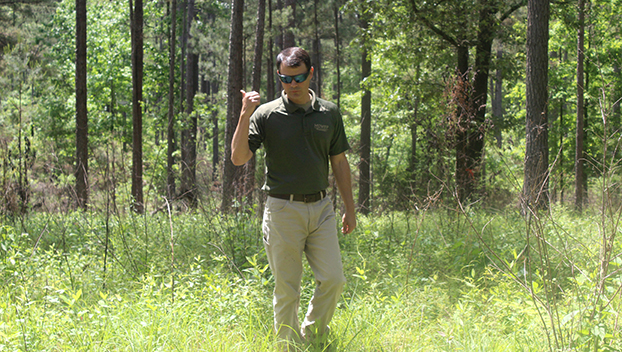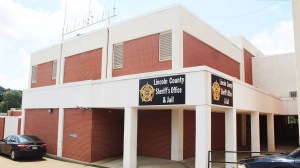Prescribed fire can shape the landscape for turkeys, quail
Published 10:45 am Saturday, May 6, 2023

- Adam Butler walks through a previously burned unit at Copiah Wildlife Management Area. Part of this stand was burned with fire during the dormant season and has been thinned to encourage sunlight on the ground and the use of herbicides to selectively eliminate undesirable plants. (Hunter Cloud | The Daily Leader)
BARLOW — Ecosystems in the southeastern United States have long been adapted for fire and recovering from fire. Pines, hardwoods and wildlife depend on the natural disturbance of fire and are adapted to it.
Fire has also helped turkey production at Copiah Wildlife Management area as Turkey Program Director Adam Butler said the WMA has shown growth each year in its harvest trend data. In 2022, 14 birds were harvested, two more than the 10 year average and six more than in 2021.
It took hunters on average 24.9 man days to kill a turkey at Copiah County WMA in 2022 compared to the long term average of 44.9 days. Copiah as a county led the southwest region of the state in reported turkey harvests this year.
Trending
Prescribed fire is used to create better habitat for turkeys, deer and quail in the area by removing woody understory and encouraging forbs and vegetative growth which provide nesting and brooding cover. Copiah WMA manager Med Palmer was getting ready to disk another fire break as he stopped to speak with Butler and Private Lands Program director John Gruchy.
Butler said this week was one of the first times they have had good days for burning this year with calm winds and consecutive dry days. MDWFP burned a thinned pine stand with some hardwoods in it as part of an ongoing research project looking at the timing of fire and what it produces. A fire was still burning from a log on the ground, the prescribed fire was started the day after turkey season closed. Some people might worry about nests being destroyed by fire this time of year but Butler said it is all dependent on scale.
“Even on the national forest, if you step back and take a look, the amount of land they burn is not that much,” Butler said. “They did a study on the Homochitto National Forest from 1999-2000. It incorporated 60 to 70 nests over two years. Only four nests were lost to prescribed burning and one of the four nests actually returned to finish incubating. I can understand the perspective of a hunter who sees where nests have been burned. It is like everything else though. Scale and diversity matters.”
It is important to point out that Mississippi seems to have had an early hatch this year. Palmer told Butler he had heard of poult sightings in the second half of April. A forester in Jefferson County said he jumped a hen this past weekend and noticed quail-sized poults in the nest.
Burns this time of year could help encourage good brood cover. Butler said his recommendation to land owners concerned about burning during nesting is to simply not burn. There are other times of the year where burning can be done.
The test plots at Copiah Wildlife Management Area are seeking to answer a question of how fire benefits the understory community at other times of the year. Sometimes, managers are limited when they can burn due to weather conditions. Butler said February was hard to burn due to it being so wet.
Trending
“It is always better to burn some then none hands down,” he said. “If you want to change turkeys, burn more. Copiah already sat in a great spot for turkeys. We had an epiphany in 2010. We weren’t doing our due diligence on WMAs for turkeys and we started working on places like Copiah. We have done timber cuts here on 20 percent. It has been thinned. We manage with wildlife in mind here. Wildlife is our soul goal. If you look at this stand it looks different from a timber production stand. We have pockets of trees here and there, some are dense, others are light. You have diversity across the stand due to the prescribed forest we have done. Since we have done that, turkey harvests have climbed.”
Of Mississippi’s 19.24 million acres of forest only 216,003 acres are disturbed by fire according to the 2021 United States Department of Agriculture Forest Inventory Analysis report. Prescribed fire helps turkeys and it also helps quail and other birds tied to early successional habitats. On the way to Copiah WMA, Gruchy said he noticed a couple of quail coveys flush up from beside Barlow Road. Copiah has some of the highest quail call counts in the south region according to the MDWFP quail program page.
Gruchy pointed to a burn study conducted at Fort Bragg in North Carolina where 20 percent of the forest is burned during turkey season. It is an exceptionally high percentage of acreage burned annually at Fort Bragg whereas places in West Texas might burn once every 10 years.
“The study at Fort Bragg shows a scale no one will ever get to. Out of the 30 nests they studied at Bragg only one was lost to fire,” Gruchy said.
Private landowners hold 88.64 percent of the forested lands in Mississippi and could make an impact in burning a small portion of that. Quail, turkeys and other ground nesting birds need prescribed burning for their niche habitat requirements.
The Mississippi Department of Wildlife, Fisheries and Parks will present a workshop on prescribed fire at Camp Shelby next Friday. The workshop will be held in partnership with the Mississippi State University Extension Service and Mississippi Army National Guard.
Landowners and wildlife enthusiasts can learn more about prescribed fire at the workshop. Camp Shelby is located in Perry and Forest Counties near McLaurin. If you leave Hattiesburg, take US49 south to Southgate Road and then follow the signs to building 6530. The workshop will include safe and effective use of prescribed fire, fire ecology and wildlife
habitat, and legal issues related to prescribed burning in Mississippi. Butler will discuss the use of fire during the turkey nesting season as an added bonus.
Weather permitting, participants will have a chance to assist in a prescribed burn demonstration. Pre-registration is required, visit www.mdwfp.com/fireontheforty, call 601-545-6083 or email phyllis.parker@msstate.edu to register. For more information about prescribed fire or to request a visit from a wildlife biologist visit www.mdwfp.com/privatelands or call 601-432-2199.




